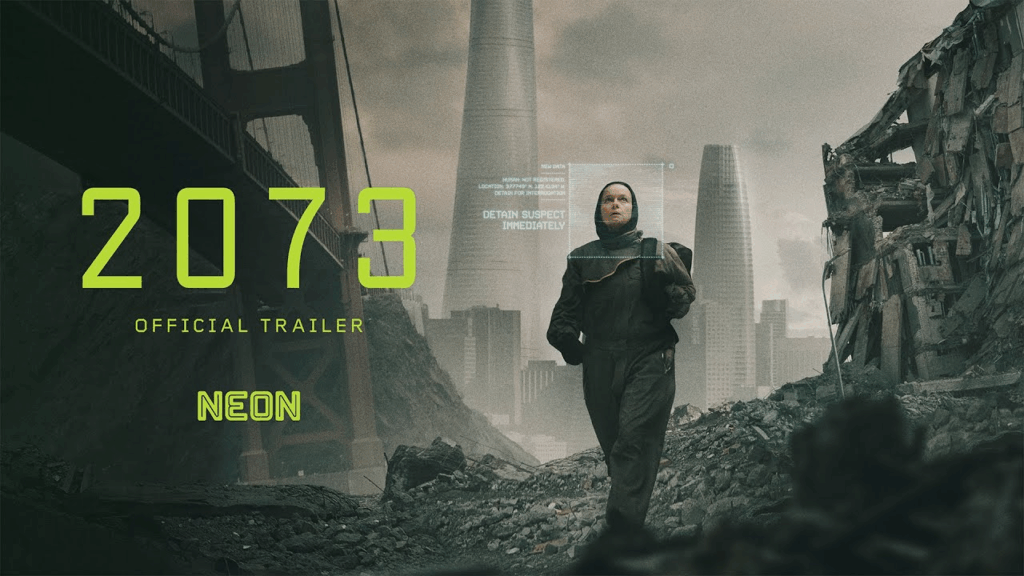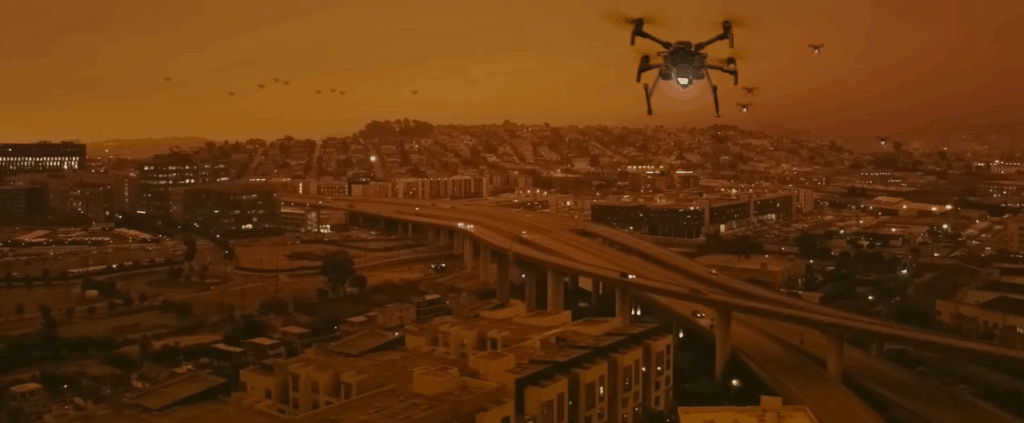2073 (2024)

Introducing 2073 (2024): A Stark Warning from a Dystopian Future
Premiering on September 3, 2024, at the 81st Venice International Film Festival, 2073 is a genre-bending docudrama from Academy Award-winning director Asif Kapadia (Amy, Senna). Blending visionary science fiction with chilling nonfiction, this 83-minute film delivers a sobering vision of a dystopian future set in 2073, serving as both a cinematic experience and a urgent call to action. Starring Samantha Morton and Naomi Ackie, 2073 uses a unique narrative structure to warn of the consequences of unchecked global crises. Here’s everything you need to know about this provocative and polarizing film.

Plot: A Hybrid of Fiction and Reality
Set in the year 2073, 2073 transports viewers to New San Francisco, a scorched, tech-dominated police state where democracy and personal freedoms have been obliterated. The story follows a mute survivor known as Ghost (Samantha Morton), who scavenges in the ruins of a shopping mall, haunted by visions of the past—our present—while narrating the collapse of society. Through her eyes, we witness a world ravaged by climate change, corporate fascism, and authoritarianism, with surveillance drones filling burnt-orange skies and militarized police enforcing a brutal regime.
The film alternates between fictional scenes of this dystopian future and documentary-style segments featuring real archival footage and interviews with journalists and activists like Maria Ressa, Rana Ayyub, and Carole Cadwalladr. These segments trace the roots of the collapse to contemporary issues: the rise of global fascism, unchecked technology, social media disinformation, and environmental destruction. Inspired by Chris Marker’s 1962 experimental short La Jetée, 2073 weaves past, present, and future into a narrative that warns of a world spiraling toward “the Event”—a vague but catastrophic turning point. The film’s tagline, “This is not fiction. This is not a documentary. This is a warning,” encapsulates its mission to jolt audiences awake.

The Cast and Voices
Samantha Morton delivers a haunting performance as Ghost, a survivor whose selective mutism and voiceover narration anchor the film’s emotional core. Her performance draws parallels to her roles in Minority Report and Children of Men, clips from which are cleverly integrated as if part of Ghost’s backstory. Naomi Ackie and Hector Hewer appear in supporting roles, though the fictional narrative remains sparse to prioritize the documentary elements.
The nonfiction segments feature prominent voices, including:
- Maria Ressa, Filipina journalist, on state-sanctioned surveillance and disinformation.
- Rana Ayyub, Indian columnist, on persecution of minorities and democratic erosion.
- Carole Cadwalladr, British journalist, on tech-driven political manipulation.
- George Monbiot, Anne Applebaum, and others, providing commentary on climate change, authoritarianism, and AI’s ethical dilemmas.
These real-world perspectives ground the film’s speculative fiction, amplifying its urgency but sometimes overwhelming its narrative coherence.

Behind the Scenes: Creative Team
Directed by Asif Kapadia, known for his acclaimed pop-culture documentaries, 2073 is a bold departure that merges his documentary expertise with sci-fi storytelling. Co-written with Tony Grisoni, the film is produced by Kapadia’s Lafcadia Productions, alongside Neon, Double Agent, Film4, and Riz Ahmed’s Left Handed Films, with executive producers including Davis Guggenheim and Nicole Stott. Cinematographer **Brad beautiful yet haunting cityscapes, while editors Chris King and Sylvie Landra skillfully blend archival footage with fictional sequences, though some critics note the montage-heavy approach lacks focus.
Drawing inspiration from La Jetée, Kapadia uses a collage-like structure reminiscent of non-narrative documentaries like Koyaanisqatsi, incorporating newsreels, cellphone footage, and clips from films like Children of Men to blur the line between reality and fiction. The film’s visual style, with drone shots of existing war-torn cities and refuse-filled seas, creates a chilling sense of familiarity, though some argue it relies too heavily on recycled imagery.

Themes and Message
2073 tackles interconnected global crises: climate change, the rise of autocrats (referencing figures like Trump, Modi, and Xi), the unchecked power of tech giants (Zuckerberg, Musk, Bezos), and the erosion of democracy through surveillance and AI. The film argues that these forces, already at play, could culminate in a dystopian future if left unchecked. Its documentary segments highlight real-world examples, such as the oppression of Uyghurs in China and Hindu extremism in India, to underscore the stakes.
However, the film’s unrelenting bleakness and lack of actionable solutions have sparked debate. Critics argue it preaches to the choir, alienating less politically engaged viewers, while supporters praise its raw urgency and call to awareness. The inclusion of real footage—depicting violence, dead bodies, and environmental devastation—earns its R rating and makes for a heavy, often despairing watch.

Critical Reception and Controversy
2073 has polarized critics, earning a 48% approval rating on Rotten Tomatoes (44 reviews) and a Metacritic score of 52/100 (10 critics), indicating mixed reviews. Supporters, like Matthew Carey of Deadline Hollywood, praise its “disturbing plausibility” and bold vision, while Peter Bradshaw of The Guardian calls it a “relevant shout of rage” despite its lack of nuance. Conversely, Monica Castillo of RogerEbert.com critiques its lack of narrative depth, describing it as a “slick video essay” with insufficient storytelling to engage beyond scaremongering. Others, like Robbie Collin of The Daily Telegraph, dismiss it as “political signalling” that sacrifices subtlety for stridency.
Audience reactions, as seen on platforms like IMDb and Reddit, are equally divided. Some viewers applaud its wake-up call, with one Reddit user calling it a “prescient” warning, while others decry it as “political indoctrination” or a “tedious” mishmash of clichés and archival clips. The film’s heavy-handed approach and perceived bias have fueled accusations of fearmongering, particularly from those skeptical of its political lens.

Release and Availability
2073 had a limited theatrical release in the U.S. and U.K. on December 27, 2024, distributed by Neon. It is available on select streaming platforms, including HBO Max in the U.S., and was released on Blu-ray on February 25, 2025. Check Fandango, Atom Tickets, or services like Prime Video and Apple TV for showtimes and rentals. The film also screened at festivals like the 57th Sitges Film Festival and the 2024 BFI London Film Festival.

Why You Should Watch
2073 is a bold, if imperfect, experiment that challenges viewers to confront uncomfortable truths about our world’s trajectory. Its blend of dystopian fiction and real-world commentary creates a unique, if divisive, cinematic experience. Fans of Kapadia’s documentaries or films like Children of Men and The Social Dilemma may appreciate its ambitious scope, while those seeking a traditional narrative may find it lacking. The film’s strength lies in its visuals and urgent message, but its heavy-handed delivery and bleak outlook may overwhelm or alienate some viewers.
If you’re ready to face a stark vision of the future and reflect on the present, 2073 is a thought-provoking, if distressing, watch. Engage with its message, share your thoughts with #2073Film, and consider what actions we can take to steer away from this dystopian path. As Kapadia himself stated, the film aims to “connect the dots” between today’s crises and tomorrow’s consequences—whether it inspires action or despair is up to you.
